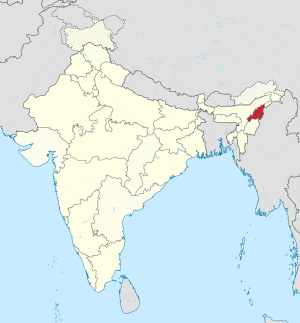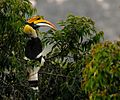Nagaland facts for kids
Nagaland is a beautiful state located in the northeastern part of India. It is known for its stunning hills, rich culture, and diverse tribes. Nagaland covers an area of about 6,401 square miles. This makes it a bit larger than some countries, but smaller than others. It is part of the interesting Northeast Indian region.
Contents
Symbols of Nagaland
Every state has special symbols that represent it. Nagaland also has its own unique symbols for its bird, animal, tree, and flower. These symbols show the natural beauty and importance of the state's environment.
State Bird: Blyth's Tragopan
The state bird of Nagaland is the Blyth's Tragopan. This is a very colorful and rare pheasant. It lives in the dense forests of the Himalayas. It is known for its bright feathers and shy nature. Protecting this bird helps keep Nagaland's forests healthy.
State Animal: Mithun
The state animal is the Mithun, also known as the Gayal. This large, semi-domesticated bovine is very important to the Naga people. It is a symbol of wealth and status. Mithuns are often used in traditional ceremonies and festivals.
State Tree: Alder
The state tree is the Alder. This tree is common in the hilly regions of Nagaland. It is known for its ability to grow quickly and help improve soil quality. The Alder tree is important for the environment and local communities.
State Flower: Rhododendron
The state flower is the Rhododendron. Nagaland's hills are home to many types of beautiful rhododendrons. These flowers bloom in vibrant colors, especially during spring. They add a splash of color to the green landscapes.
Culture and Festivals
Nagaland is often called the "Land of Festivals." The people of Nagaland, known as Nagas, celebrate many festivals throughout the year. These festivals are usually linked to agriculture or traditional rituals. They are a great way to experience the rich culture of the state.
Hornbill Festival
The Hornbill Festival is the most famous festival in Nagaland. It is held every December in Kohima, the capital city. This festival brings together all the different Naga tribes. They showcase their traditional dances, songs, crafts, and food. It is a huge celebration of Naga heritage. The festival is named after the Great Hornbill bird, which is respected by the Naga people.
Wildlife and Nature
Nagaland is rich in wildlife and natural beauty. Its dense forests and hills are home to many different animals and plants.
Amur Falcons
Nagaland is a very important place for Amur falcons. These small birds travel long distances during their migration. About a million Amur falcons stop in Nagaland every year. They rest and feed here before continuing their journey. This makes Nagaland a key spot for birdwatchers and conservationists.
Unique Plants
The state also has many unique plants. One example is the Kopou phool (Rhynchostylis retusa), a beautiful type of orchid. The Bhut jolokia (Ghost Chili pepper) also comes from this region. It is one of the hottest chili peppers in the world!
Economy and Lifestyle
Most people in Nagaland live in rural areas. They depend on farming for their livelihood.
Terrace Farming
Terrace farming is a common way of growing crops in the hilly areas. Farmers cut steps into the hillsides to create flat fields. This method helps prevent soil erosion and makes farming possible on slopes. You can see beautiful terrace farms in places like Pfutsero.
Cities and Towns
Kohima is the capital city of Nagaland. It is located in the hills and has a cool climate. Mokokchung is another important town in the northern part of Nagaland. Dimapur is the largest city and the main entry point to the state. It has an airport and a railway station.
History and People
The Naga people have a rich history and unique traditions. About 80% of Nagaland's people are Baptists. This makes Nagaland one of the few states in India with a Christian majority.
Kohima War Cemetery
The Kohima War Cemetery is a famous historical site in Kohima. It honors the soldiers who died during World War II. The Battle of Kohima was a very important battle fought here. It is a place of remembrance and peace.
Traditional Attire and Crafts
The Naga people are known for their colorful traditional clothes. They also create beautiful embroidered textiles. These crafts show their artistic skills and cultural identity.
Images for kids
-
Prime Minister Narendra Modi with Naga people in Nagaland, December 2014
-
About a million Amur falcons roost in Nagaland. That is about 50 falcons per square kilometre.
-
The Catholic Cathedral in Kohima City. About 80% of Nagaland people are Baptists.
See also
 In Spanish: Nagaland para niños
In Spanish: Nagaland para niños
 | May Edward Chinn |
 | Rebecca Cole |
 | Alexa Canady |
 | Dorothy Lavinia Brown |






















